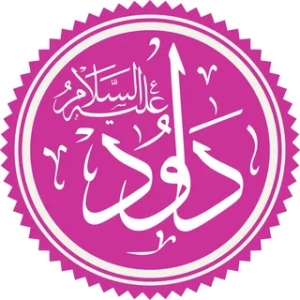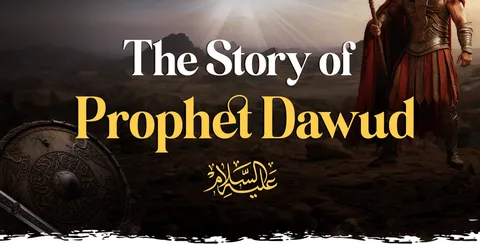Prophet Dawud (David), peace be upon him, is one of the most significant and revered prophets in Islam, Christianity, and Judaism. Known for his exceptional bravery, wisdom, and piety, Dawud is mentioned frequently in the Qur’an and the Bible. His life story is not just a tale of heroism but a model of how a person can serve God and their people with integrity, justice, and devotion. This article explores the story of Prophet Dawud (PBUH), his rise to kingship, his unique talents, and the lessons his life offers.
The Story Of Prophet Dawud

Prophet Dawud belonged to the tribe of Judah, one of the twelve tribes of Bani Isra’il (the Children of Israel). He was born into a humble household. Although not much is detailed in the Qur’an about his childhood, Islamic tradition and historical narrations indicate that he was the youngest of several brothers and worked as a shepherd. His early life shaped his character—imbuing in him patience, observation, and a close connection to nature and God.
The Battle with Goliath (Jalut)
One of the most famous events in Dawud’s life is his battle with the giant warrior Jalut (Goliath). At that time, the Israelites were under the leadership of Talut (Saul), a king appointed by Allah. Talut led his army to fight against the army of the tyrant Jalut. Dawud, though young and not a soldier, joined the army to support the cause of justice.
According to the Qur’an (Surah Al-Baqarah, 2:249–251), when the two armies met, Jalut challenged any warrior from Talut’s army to fight him in single combat. None dared to face him—except young Dawud. He went forth with strong faith in Allah, carrying a slingshot and a few stones. With one stone, he struck Jalut in the forehead and killed him instantly. This extraordinary act of courage marked the beginning of Dawud’s rise as a respected figure among his people.
Allah granted Dawud wisdom and honor for his bravery. Talut gave him his daughter in marriage and made him a commander in the army.
Read more: the story of Prophet Dhul-Kifl
Prophethood and Kingship
After the death of Talut, Dawud was chosen by Allah to become a prophet and the king of Bani Isra’il. Unlike ordinary kings, Dawud was both a ruler and a messenger of Allah. This dual role made him responsible not just for political governance but also for spiritual guidance.
Allah granted him the Zabur (Psalms), a holy scripture filled with praises and divine wisdom. The Qur’an refers to the Zabur as a book of songs and prayers that offered moral teachings and spiritual nourishment. His ability to recite the Zabur in a melodious voice is legendary; mountains and birds would join him in glorifying Allah.
“Indeed, We gave Dawud favor from Us: ‘O mountains, repeat [Our] praises with him, and the birds [as well].’”
— (Surah Sad 38:18)
The Gifts of Allah
Prophet Dawud was blessed with several divine gifts:
1. Beautiful Voice
He had a powerful, beautiful voice. When he recited the Zabur, creatures of nature—birds, animals, and even mountains—would join in harmony. His voice touched the hearts of people and deepened their connection to Allah.
2. Wisdom and Justice
Dawud was renowned for his fairness and wisdom. He resolved conflicts with great insight. One famous story in the Qur’an (Surah Sad 38:21–24) involves two men who came to him with a dispute over a ewe. Dawud initially ruled in favor of one, but upon reflection, he realized he had judged too quickly. He immediately repented and corrected his judgment. This teaches us the importance of humility and self-correction, even for a prophet.
3. Mastery of Iron
Allah gave him the miracle of softening iron with his hands, enabling him to craft armor and tools. This skill contributed to his kingdom’s strength and self-sufficiency.
“And We made iron pliable for him.”
— (Surah Saba 34:10)
Read about: the story of prophet yusef
Leadership and the Model of Justice
Prophet Dawud ruled with utmost fairness. He was deeply loved by his people and led a balanced life—serving as a king, a prophet, a judge, and a devout worshiper. According to Hadith, the Prophet Muhammad (PBUH) praised Dawud’s devotion:
“The most beloved fasting to Allah is the fasting of Dawud: he would fast one day and break his fast the next. And the most beloved prayer to Allah is the prayer of Dawud: he would sleep half the night, stand in prayer for one-third of it, and sleep for one-sixth of it.”
— (Sahih al-Bukhari)
Dawud’s fasting and prayer habits show his strong connection with Allah, despite the responsibilities of kingship. He never allowed power to corrupt him or divert him from his spiritual duties.
The Legacy of Prophet Dawud
Prophet Dawud left behind a powerful legacy of justice, worship, humility, and strength. His life is a blueprint for believers in how to balance material success with spiritual depth.
His son, Prophet Sulaiman (Solomon), inherited both his kingdom and prophethood. Sulaiman would become one of the greatest prophets and kings in history, continuing the legacy of justice and divine guidance started by his father.
In the Islamic view, the story of Dawud is a testament to the idea that true strength comes from faith, and that sincere repentance, justice, and worship are the most honorable traits in the eyes of Allah.
Recommend: The Story of prophet ismael
FAQs
What was the holy book revealed to Prophet Dawud?
The holy book revealed to Prophet Dawud was the Zabur (Psalms). It consisted of songs, praises, and spiritual guidance.
How did Dawud become a prophet?
Dawud was chosen by Allah due to his righteousness and courage, especially after defeating Jalut (Goliath). Allah later appointed him as both a prophet and king of Bani Isra’il.
What is Prophet Dawud known for?
Prophet Dawud is known for his beautiful voice, fair judgments, bravery (especially in the battle against Jalut), piety, and leadership. He is also recognized for his deep worship and his role as a just ruler.
Was Dawud a king or just a prophet?
Answer: He was both a king and a prophet. He governed the Israelites and delivered divine guidance through the Zabur.
What is the significance of Dawud’s battle with Jalut?
Answer: The battle demonstrated Dawud’s unshakable faith and courage. Despite being young and inexperienced in battle, his trust in Allah allowed him to defeat the mighty warrior Jalut. This event marked the beginning of his rise as a prophet and king.
Conclusion
The story of Prophet Dawud (peace be upon him) is filled with lessons on faith, courage, humility, and leadership. As a young shepherd, he faced a giant with unwavering belief. As a prophet and king, he ruled with justice, worshiped Allah with devotion, and constantly sought forgiveness when he erred. His story is a powerful reminder that Allah honors those who stand for truth and remain humble in power.
In today’s world, Dawud’s life offers timeless wisdom: that success is not only measured by worldly achievements but by how one uses their gifts to serve justice, help others, and draw closer to God.

